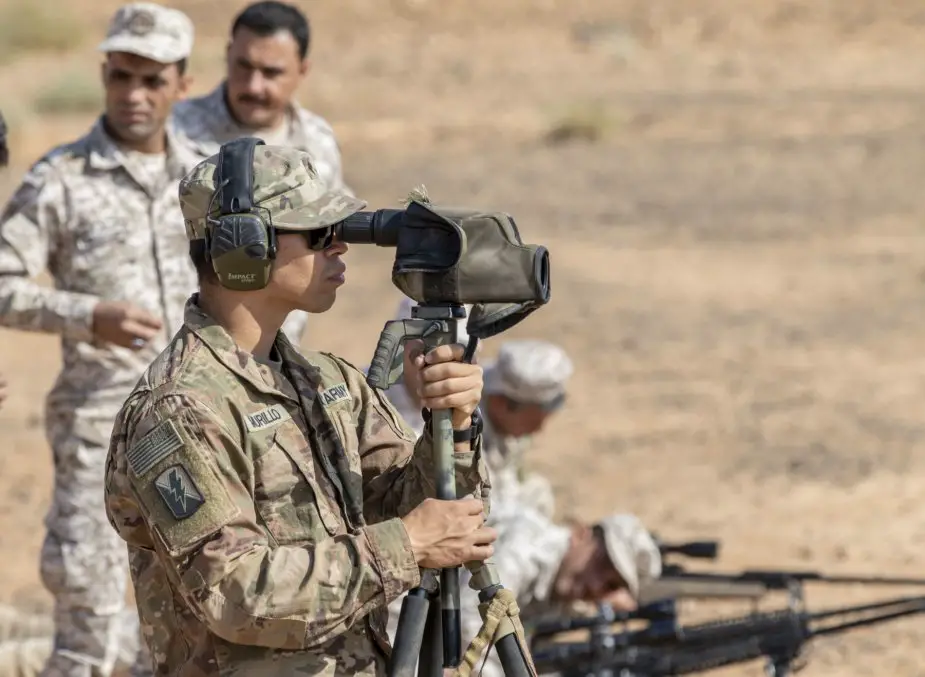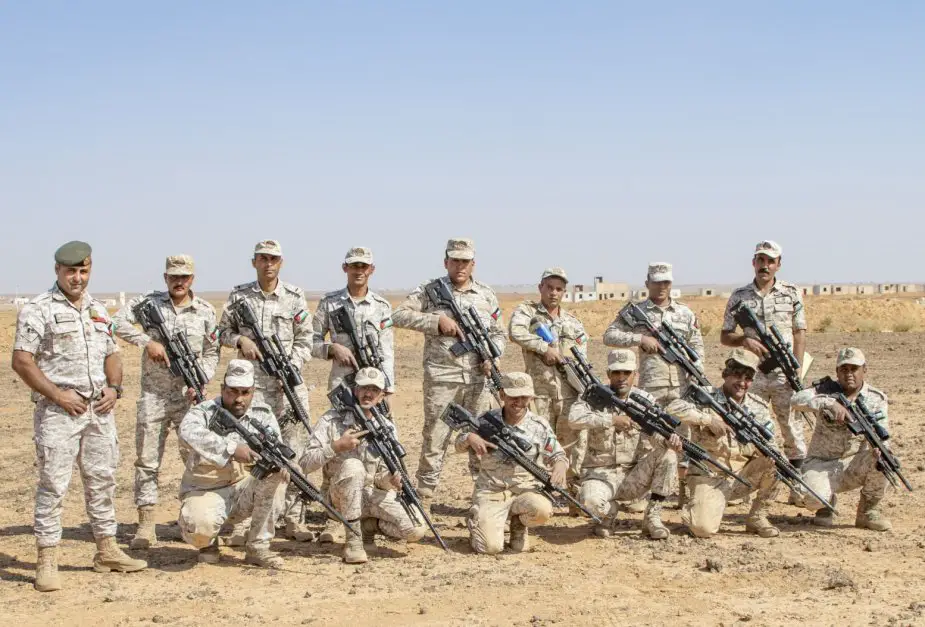Snipers aim to sharpen shooting, teaching skills
The art of sniping is more than just proper cover, concealment and sight alignment; it demands vigilant situational awareness, flawless timing and solid arithmetic skills. Sgt. 1st Class Shaiyla Hakeem explains on U.S. Army’s website.

Jordan Armed Forces-Arab Army (JAF) snipers practice shooting during a Sniper Subject Matter Expert Exchange with Military Engagement Team-Jordan, 158th Maneuver Enhancement Brigade, Arizona Army National Guard, at a base outside of Amman, Jordan in October 2019 (Picture source: Sgt. 1st Class Shaiyla B. Hakeem)
U.S. Soldiers had a five-day Sniper Subject Matter Expert Exchange (SMEE) with Jordan Armed Forces-Arab Army (JAF) snipers at a base outside of Amman, Jordan, in October 2019. The Military Engagement Team-Jordan (MET-J), 158th Maneuver Enhancement Brigade, Arizona Army National Guard; in collaboration with Jordan Operational Engagement Program (JOEP) Soldiers; 1st Squadron, 102nd Cavalry Regiment, 44th Infantry Brigade Combat Team, 42nd Infantry Division, New Jersey National Guard. "As a group, we [MET-J, JOEP] were able to collaborate and come up with a good exchange," said U.S. Army Master Sgt. Johnny Vidrio, with MET-J, 158th MEB, AZANG, "The sniper field is a perishable skill so you have to use it a lot to retain it. We are working with the JAF to keep our exchanges going."
Snipers are known for their specialization in shooting targets from long-range distances with a modified weapon, as well as their reconnaissance abilities. Vidrio, who served as the Sniper SMEE team lead, has more than 20 years' experience with various weapons systems through his civilian and military occupations.
Vidrio explained how the MET-J shared information on how the U.S. Army executes sniper tasks and in turn, the Jordanians shared their way of doing the same task. The exchange not only reviewed basic sniper skills but incorporated different approaches to instructing the material to other Soldiers. The two nations were able to work through the Jordanians' Basic Sniper Manuel which provided a platform for the Jordanian snipers to hone their basic skills and enhance their teaching techniques. "The more you teach with a group, the more comfortable you will feel teaching by yourself," explained Vidrio, "That's what we were doing, helping them feel comfortable about teaching."
MET-J facilitates and conducts military-to-military engagements with regional partners within the U.S. Army Central area of responsibility in order to build military partner capability and capacity, enhance interoperability and build relationships.

A U.S. Army Soldier, with 1st Squadron, 102nd Cavalry Regiment, 44th Infantry Brigade Combat Team of the 42nd Infantry Division, New Jersey National Guard, looks downrange through a tactical monocular during a Sniper Subject Matter Expert Exchange between the Jordan Armed Forces-Arab Army (JAF) and Military Engagement Team-Jordan, 158th Maneuver Enhancement Brigade, Arizona Army National Guard at a base outside of Amman, Jordan in October 2019 (Picture source: Sgt. 1st Class Shaiyla B. Hakeem)
Areas covered during the Sniper SMEE included setting up a comfortable firing position, weapons maintenance, correcting malfunctions, zeroing and determining wind values, to name a few. The snipers discussed how half value, full value, tail, and headwinds affect the drift of a bullet. They examined techniques to find the directional movement of wind, such as observing the path of dust, smoke, trash or mirage waves, that are near an intended target. Target range estimation was calculated through a mathematical equation, but each nation used a different formula. "They [JAF] have a different calculation for range estimation, this was new to American snipers," said Vidrio "We learned a whole new way of estimating distance and ranges."
SMEEs allow open information flow and an opportunity for coalition Soldiers to work together, learn and grow from one another, which is beneficial to both counties. The United States is committed to the security of Jordan and to partnering closely with the JAF to meet common security challenges.
One Soldier who expressed favor in ongoing SMEEs with U.S. Army was JAF Sgt. 1st Class Ghareeb Alaomary, sniper instructor and logistics coordinator. He too specifically found value in the transfer of knowledge with the arithmetical equation calculations for target distance and range. "The mathematic equation formulas given [by the U.S.] were new information for us," explained Alaomary, "It added to their [JAF snipers] knowledge to help make more accurate calculations."
According to Alaomary, the exchange between the two countries was engaging and an abundance of wisdom was shared, which resulted in a successful exchange. They plan to take the knowledge gained through the Sniper SMEE back to their individual units to cross-train with their comrades. "I would like to give a special thanks for the effort you [U.S. Army] have dedicated to the students and the valuable information you have provided," said Alaomary.
The U.S. military has a long-standing relationship with Jordan to support our mutual objectives by providing military assistance to the JAF consistent with our national interests. Our people and governments have a historic, unbreakable, strategic relationship that spans decades and different administrations. Jordan is not only one of the United States' closest allies in the region but in the world as a whole. This isn't going to change.

Jordan Armed Forces-Arab Army (JAF) snipers pose for a photo after the completion of a Sniper Subject Matter Expert Exchange with Military Engagement Team-Jordan, 158th Maneuver Enhancement Brigade, Arizona Army National Guard, at Joint Training Center-Jordan in October 2019 (Picture source: Sgt. 1st Class Shaiyla B. Hakeem)


























